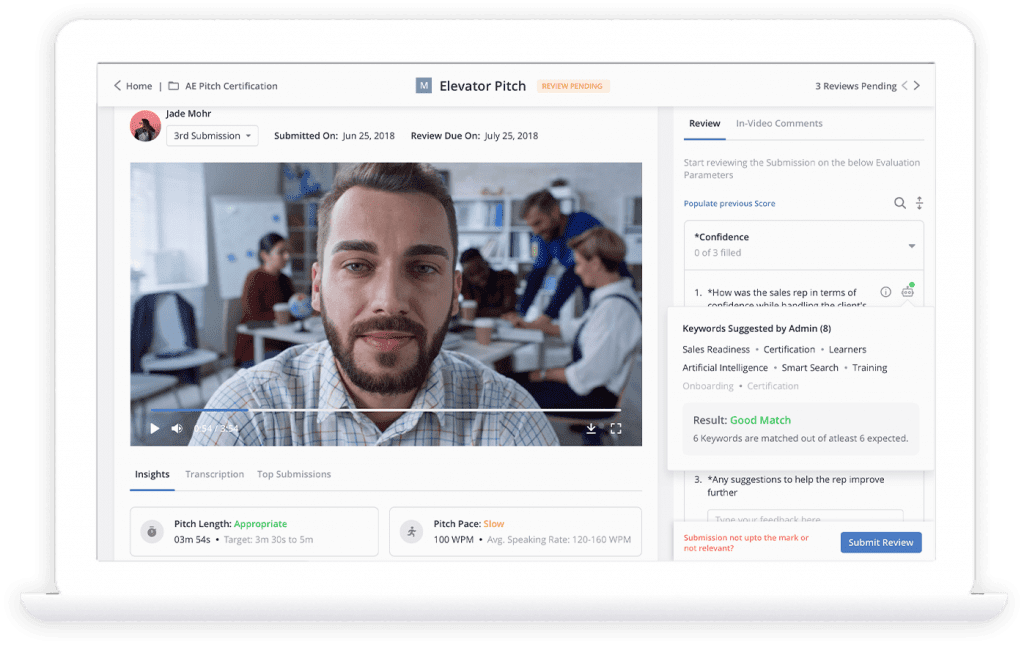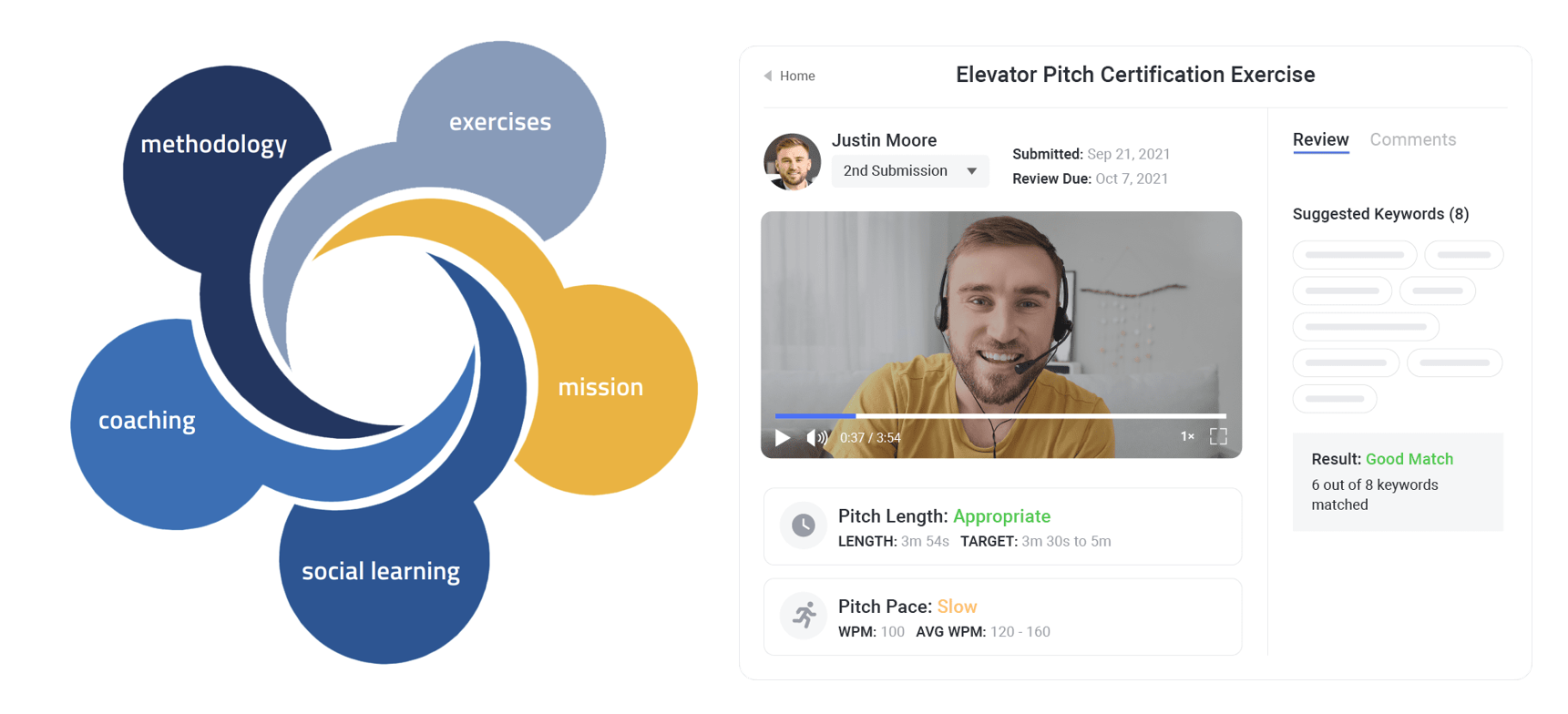The Real Reason Sales Role Play Fails—and How AI Role Play Fixes It
Yesterday, I hosted a live sales training call with a client’s sales team.

In order to win, recruiting teams must create a ‘wow experience’ for their customers and candidates. This means recruiting professionals must be enabled with the knowledge to educate their candidates and customers with fresh ideas and unique perspectives, and the skills to collaborate and ask thought-provoking questions to help them think through ideas and discover new ways for achieving their goals.
thought-provoking questions to help them think through ideas and discover new ways for achieving their goals.
Sounds great, but how in the world do you teach this?
As the name suggests, Experiential Learning is the process of learning through experience or “learning by doing.” Since we were young kids, we’ve been told to go outside and play and learn from the world around us. Like the first time we tried to ride a bike without training wheels or the first time you tried to swim. What these experiences taught us is that we don't just learn through trial and error, we learn through reflection and feedback.
Experiential Learning is effective because it provides learners with experience in practicing and applying new skills, implementing new processes, applying new knowledge and navigating new situations and learning from those experiences. But it is also effective because it encourages learners to reflect on the activities they have participated in. With Experiential Learning, learners are no longer just focused on the ‘how’ of their task or activity but also why they are doing it.
Download Now: 7 Keys to Effective, Efficient Recruiter Onboarding
Experiential Learning theory was initially introduced by psychologist David Kolb who emphasized how experiences influence the learning process. Kolb identified four components of Experiential Learning:
Kolb’s Experiential Learning Theory is a powerful approach to all forms of learning, development and change because it invites you to understand yourself as a learner, and empowers you to take charge of your own learning and development.
It’s no longer enough to simply impart information; studies show that offering repeated opportunities for practice of new information and skills vastly improves learning, both in the quantity of what’s being taught and the quality of the application.
Four Benefits to Experiential Learning
Learners Quickly Learn, Grasp and Apply Concepts to Different Situations
One of the biggest and most common challenges with training is getting learners to grasp a new concept they don’t yet fully understand. With Experiential Learning, learners are given the opportunity to apply skills and knowledge in real-world situations where they play an active role. As the learner interacts with the information, it becomes real to them. Consider the following everyday, real-life situations recruiters find themselves in with candidates:
The illustration below highlights how Menemsha Group incorporates Experiential Learning into training programs.

The methodology is the central idea or concept including the teaching points. The exercises are individual or group activities focused on understanding the concept. The mission is the Experiential Learning exercise where learners interact with the concept and execute the methodology in real world, everyday staffing scenarios. Social learning and coaching is an opportunity for peers and managers to model the behavior, provide feedback and give learners an opportunity to reflect on what they have learned.
Experiential Learning Gives Learners the Opportunity to be Creative
I once worked with a customer who was (and still is) a great salesperson. He always said sales is all about “reading and reacting.” You have to read what the customer (or candidate) says and then you have to react (with a credible and knowledgeable response). Experiential Learning is one of the best ways to teach recruiters and salespeople the ability to think on their feet or “read and react.”
With Experiential Learning, learners discover there are multiple ways to approach a situation or solve a problem. They are encouraged to try different approaches until they find the approach that works best for them while achieving the desired outcome. Engaging in live role-play practice is a perfect example, it encourages creative problem solving with real-world content.
Learners Have the Opportunity to Learn Through Reflecting
Giving learners the opportunity to share their accomplishments and struggles and even their moments of confusion and failure encourages them to focus on their personal strengths and weaknesses. This gives them self-awareness regarding the skills and knowledge they have developed and those that need additional refinement.
Learning through reflection also helps people develop critical thinking skills and improve future performance by analyzing what they have learned and how far they have come. This invites them to become more invested in their own learning and development and the pursuit of their own goals.
Learners Learn Valuable Lessons From Their Mistakes
As learners engage in Experiential Learning exercises they discover that some approaches work better than others. They learn to discard the approaches that don’t work, but the act of trying something and then abandoning it is the most valuable part of the learning process. Because Experiential Learning takes place in a safe environment, learners learn to not fear making a mistake, but to value mistakes.
Perhaps the most important benefit of Experiential Learning is that it is authentic and highly relevant. It helps learners find meaning in the skills and knowledge they are being taught and connect and apply them to real life scenarios. It bridges the gap between theory and practice and gives your training and what you teach meaning. Finally, Experiential Learning provides your team with a safe place to fail and delivers a compelling ROI because it enables an accurate assessment of your employees’ ability to apply the skills and competencies being taught.
To learn more about how the benefits of experiential learning and how it accelerates new recruiter ramp up time, download our ebook, The Seven Keys To More Effective, Efficient Recruiter Onboarding.

Yesterday, I hosted a live sales training call with a client’s sales team.

1 min read
Most staffing firms don’t struggle to scale because their teams aren’t working hard. They struggle because they don’t have a real go-to-market...

In my previous post, How to Prevent Unexpected Contract Terminations, I shared how systemizing consultant and client check-ins at key milestones...